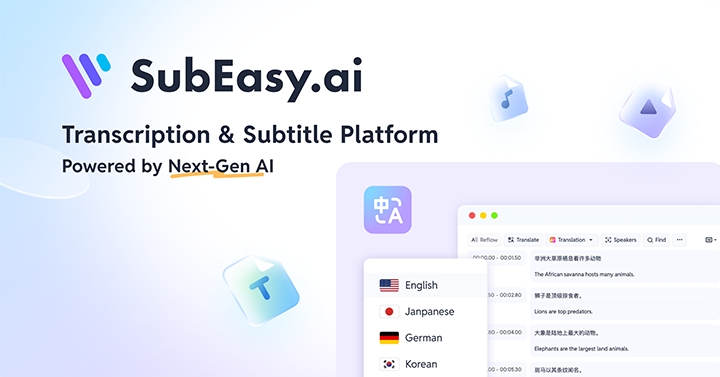Best Cantonese Translator Online – How to Accurately Translate Cantonese in 2026
Cantonese is one of the most expressive and culturally rich languages in the world—widely spoken in Hong Kong, southern China, and overseas communities.
But finding a good Cantonese translator—especially one that handles spoken Cantonese accurately—is not easy.
In this guide, we’ll explain what makes Cantonese so hard to translate, and introduce you to the best online Cantonese translator for audio, video, and subtitles.
What Makes Cantonese Translation So Difficult?

- Tonal Language: Cantonese has 6–9 tones that completely change word meanings
- Colloquial Speech: Common phrases like “得啦” or “唔該” don’t have direct English equivalents
- Code-Switching: Speakers often mix in English or Mandarin
- Written vs. Spoken Divide: Written Chinese (like in newspapers) differs from daily spoken Cantonese
These factors make traditional dictionary-based translation tools unreliable.
SubEasy – A Smart Cantonese Translator for Real Speech
 SubEasy is an online AI-powered platform that offers Cantonese transcription and translation designed for spoken, informal, real-world usage.
SubEasy is an online AI-powered platform that offers Cantonese transcription and translation designed for spoken, informal, real-world usage.
What SubEasy Does:
- Accepts audio or video in spoken Cantonese
- Transcribes into Traditional Chinese or Simplified (your choice)
- Translates into fluent, context-aware English
- Allows editing + subtitle export (SRT), plain text (TXT), or DOCX
What You Get in the Free Plan
- 3 free sessions per day
- Up to 30 minutes of audio/video per session
- Access to full editing + export tools
- Browser-based – no downloads required
Why SubEasy Is Better Than Text-Only Tools
Traditional tools like Google Translate struggle with:
- Colloquial expressions
- Tone-sensitive words
- Contextual slang and regional pronunciation
SubEasy solves this by transcribing real speech first, then translating based on context—not isolated words.
How to Use SubEasy as a Cantonese Translator
- Go to SubEasy
- Upload your Cantonese audio or video file
- SubEasy generates a Traditional Chinese transcript
- Click “Translate” → Get English version instantly
- Edit and export for use in subtitles, reports, or content creation
Common Use Cases

- Translating Cantonese interviews for YouTube or podcasts
- Adding English subtitles to Hong Kong films or short videos
- Understanding customer calls or voice notes from Cantonese speakers
- Localizing video content for international audiences
Conclusion
If you're looking for a Cantonese translator that handles spoken language, idioms, and subtitles—not just dictionary words—SubEasy is your best option.
It’s accurate, context-aware, and built for creators, marketers, and professionals who work with real audio—not textbook sentences.
Ready to try the best Cantonese translator online? Try SubEasy now
Already working with Thai content? Check out our guide on Thai to English translation.


